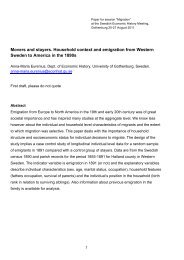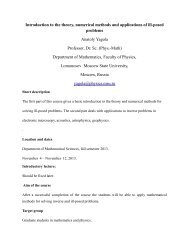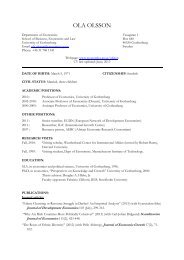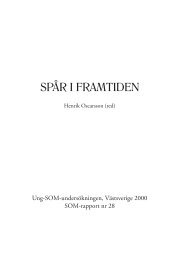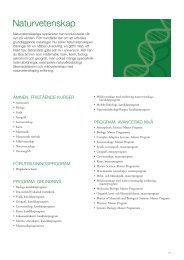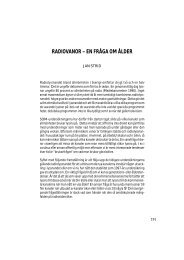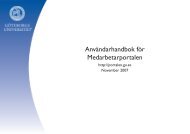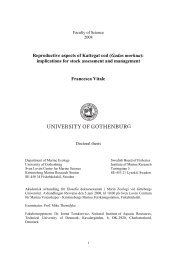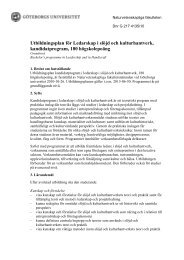development of small-scale intermodal freight transportation in a ...
development of small-scale intermodal freight transportation in a ...
development of small-scale intermodal freight transportation in a ...
You also want an ePaper? Increase the reach of your titles
YUMPU automatically turns print PDFs into web optimized ePapers that Google loves.
the dissertation <strong>in</strong>dicate that a systems approach is an appropriate po<strong>in</strong>t <strong>of</strong> departure.<br />
Hence, the question lead<strong>in</strong>g the presentation <strong>in</strong> chapter 2 is: What does systems theory – <strong>in</strong><br />
a wide sense – <strong>of</strong>fer to the understand<strong>in</strong>g <strong>of</strong> the complexity <strong>of</strong> <strong><strong>in</strong>termodal</strong> <strong>transportation</strong><br />
systems?<br />
1.3 RESEARCH PROCESS AND PURPOSES<br />
Due to the <strong>in</strong>dustrial fund<strong>in</strong>g, an <strong>of</strong>ficial ma<strong>in</strong> purpose <strong>of</strong> the present research project was<br />
def<strong>in</strong>ed already before I entered the scene. The title <strong>of</strong> the project – Product <strong>development</strong><br />
with<strong>in</strong> <strong><strong>in</strong>termodal</strong> transport regard<strong>in</strong>g unit loads, rail wagons and transshipment equipment<br />
– implies a rather narrow technical orientation. The employed technology is, however,<br />
only a <strong>small</strong> part <strong>of</strong> the complex transport arrangement denoted <strong><strong>in</strong>termodal</strong> transport and it<br />
was clear to me that it had to be studied <strong>in</strong> a wider context.<br />
HULTÉN (1997, pp. 15-18) had a similar experience when study<strong>in</strong>g conta<strong>in</strong>er management.<br />
He found that his research problem required an <strong>in</strong>ductive research process <strong>in</strong>stead <strong>of</strong><br />
the conventional deductive process <strong>in</strong> which the research efforts are described as planned <strong>in</strong><br />
detail already from the start. As argued by HELLEVIK (1984, p. 67), the traditionally<br />
higher prestige <strong>of</strong> a deductive approach <strong>of</strong>ten tempts researchers to claim a deductive research<br />
process although the actually applied <strong>in</strong>ductive one is <strong>of</strong>ten equally good or even<br />
better. The risk, however, is to attract criticism for be<strong>in</strong>g what CHALMERS (1982, pp. 2-5)<br />
denotes a “naïve <strong>in</strong>ductivist” who tries to generalise from s<strong>in</strong>gle observations. His criticism<br />
stems from his view upon scientific knowledge:<br />
“The laws and theories that make up scientific knowledge all make general assertions<br />
(…), and such statements are called universal statements.”<br />
(CHALMERS, 1982, p. 3)<br />
This leads to the question: Do we really need to generalise <strong>in</strong> order to ga<strong>in</strong> “scientific<br />
knowledge”? Well, with a systems approach 36 , there is generally no such aim, but still most<br />
systems theorists claim to possess scientific knowledge and systems theory is generally accepted<br />
as a paradigm <strong>in</strong> its own right.<br />
This research project has a lot <strong>in</strong> common with HULTÉN’s and has likewise followed a<br />
rather w<strong>in</strong>d<strong>in</strong>g road. Yet, the research set out with a clear perspective <strong>in</strong> collaboration with<br />
Stefan SJÖGREN from the School <strong>of</strong> Economics and Commercial Law, University <strong>of</strong><br />
Göteborg. Jo<strong>in</strong>tly we collected very detailed data on a wide variety <strong>of</strong> <strong><strong>in</strong>termodal</strong> issues.<br />
The data collection was based upon four transport relations between Swedish and cont<strong>in</strong>en-<br />
36 This work starts out from a strong systems approach, which is briefly commented upon <strong>in</strong> the general research<br />
approach section but more comprehensively described <strong>in</strong> the next chapter.<br />
21






